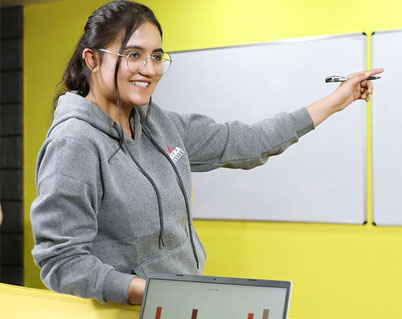Master the art of using complex models & theories, and acquire highly sought-after technical skills in data analysis.
Our B.A. in Economics with Data Science is designed to produce graduates trained in the application of knowledge in economics to real-life economic, financial, ethical and analytical problems encountered in the economy. The course will enable you to effectively apply the acquired knowledge and skills to situations of economic, institutional and policy making both in governance and industry. This unique course offers the opportunity of studying the traditional curriculum in economics alongside advanced data analytics and data science methods.
The B.A. in Economics with Data Science has a rigorous focus on quantitative techniques and research methods which will orient the students in dealing with economic problems with a practical and analytical approach. The comprehensive and wide scope of the course ensures you receive an extensive experience of the current issues and crisis of the world especially that of emerging economies.
Our 3-Year B.A. in Economics with Data Science program, offers the opportunity to extend your studies by one year and graduate with an Honours degree. In the fourth year of the B.A (Hons.) in Economics with Data Science, we offer our students the following three distinct options to choose from, each designed to elevate their academic and professional capabilities:


The first year focuses on courses including introductory microeconomics and macroeconomics, statistical techniques for economics and mathematical techniques for economics. The second year comprises intermediate microeconomics and macroeconomics, introductory econometrics, Indian Economy, public economics and development economics. In the third year, students have the option to pursue electives apart from an intensive focus on Applied Econometrics and Financial Economics. Students will also have the opportunity to take part in a 6-month internship in the last semester with major financial institutions and government organisations.
Note: Non-credit courses are also offered other than curriculum like community service, Literacy Initiatives, Short term Internships, Summer School, Exchange Programs with International Exposure as a means of providing experiential learning and enhancing the knowledge of the students.
B.A. (Hons.) Economics with Data Science
B.A. (Hons.) Economicswith Data Science in Research
Please note that we also accept Pearson Test Score and SAT Score for admission.


Our B.A. in Economics with Data Science students may look forward to a progressive and gratifying career as, but not limited to:
In order to pursue B.A. in Economics with Data Science, the students can start their application by:










































